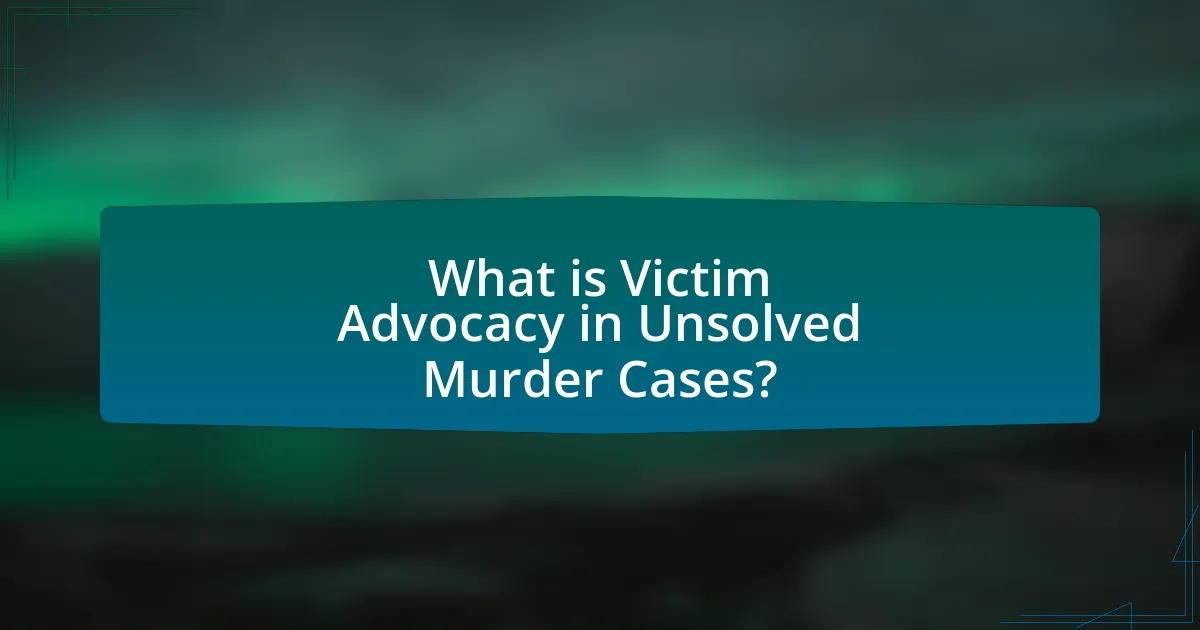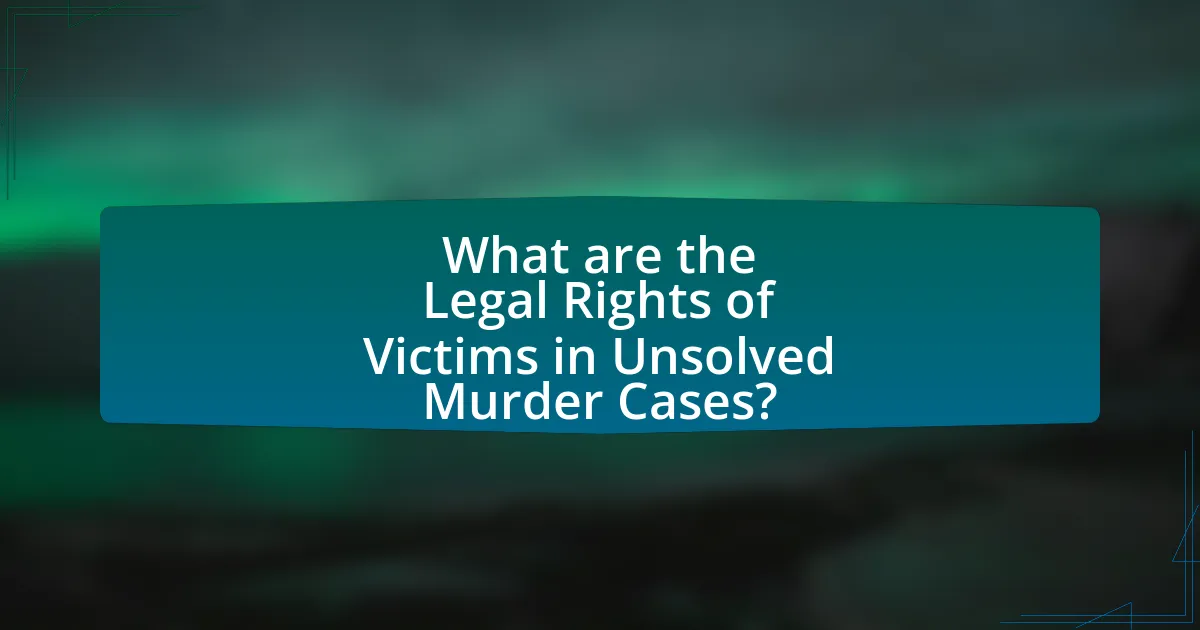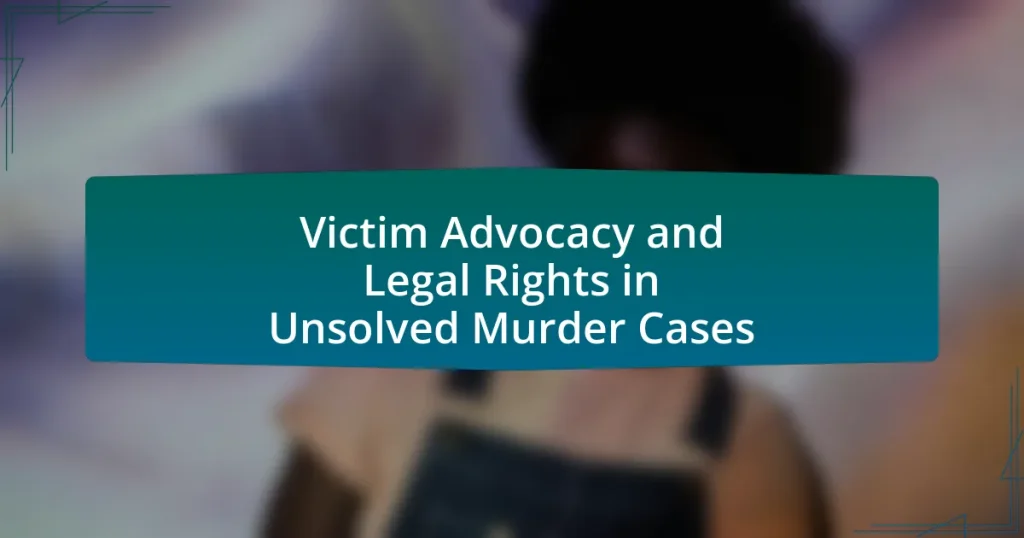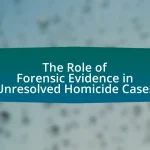Victim advocacy in unsolved murder cases plays a critical role in supporting the families of victims by ensuring their rights are upheld and facilitating communication with law enforcement and the legal system. This article explores the functions of victim advocacy, the emotional and psychological challenges faced by families, and the legal rights available to them. It highlights the importance of advocacy in raising public awareness, influencing policy changes, and providing essential resources to families navigating the complexities of unresolved cases. Additionally, the article examines the obstacles families encounter in seeking justice and the practical steps they can take to assert their rights and advocate for themselves effectively.

What is Victim Advocacy in Unsolved Murder Cases?
Victim advocacy in unsolved murder cases refers to the support and assistance provided to the families and loved ones of victims whose murders remain unresolved. This advocacy aims to ensure that the rights of these individuals are upheld, while also facilitating communication with law enforcement and the legal system. Victim advocates often help families navigate the complexities of the criminal justice process, provide emotional support, and connect them with resources such as counseling and legal assistance. The role of victim advocacy is crucial in raising awareness about unsolved cases, as it can lead to increased public interest and potentially new leads in investigations.
How does victim advocacy function in the context of unsolved murder cases?
Victim advocacy in the context of unsolved murder cases functions by providing support, resources, and representation for the families of victims. Advocacy organizations work to ensure that the voices of victims’ families are heard, helping them navigate the legal system and access necessary services. For instance, these organizations may facilitate communication with law enforcement, provide emotional support, and assist in obtaining information about the investigation’s progress. Research indicates that victim advocacy can lead to increased satisfaction with the criminal justice process, as families feel more informed and supported during the often prolonged and distressing period of an unsolved case.
What roles do victim advocates play in supporting families of murder victims?
Victim advocates play crucial roles in supporting families of murder victims by providing emotional support, facilitating access to resources, and guiding them through the legal process. These advocates offer a compassionate presence, helping families navigate their grief while also connecting them with counseling services, support groups, and financial assistance programs. Furthermore, victim advocates assist families in understanding their rights within the criminal justice system, ensuring they are informed about case developments and available legal options. Research indicates that families who receive support from victim advocates report feeling more empowered and less isolated during the traumatic aftermath of a murder, highlighting the importance of these roles in the healing process.
How do victim advocates collaborate with law enforcement and legal entities?
Victim advocates collaborate with law enforcement and legal entities by facilitating communication and providing support to victims throughout the legal process. They often serve as liaisons, ensuring that victims’ rights are upheld and that they receive necessary resources, such as counseling and legal assistance. This collaboration is crucial in cases of unsolved murders, where advocates help victims’ families navigate the complexities of the justice system, ensuring that their voices are heard and their needs are addressed. Studies indicate that effective collaboration can lead to improved victim satisfaction and increased cooperation with law enforcement, ultimately aiding in the resolution of cases.
Why is victim advocacy important in unsolved murder cases?
Victim advocacy is crucial in unsolved murder cases because it ensures that the rights and needs of the victims’ families are prioritized and addressed. Advocacy provides emotional support, helps families navigate the legal system, and raises public awareness about the case, which can lead to new information or tips. Research indicates that cases with active victim advocacy often see increased community engagement and media attention, which can be pivotal in generating leads. For instance, the National Center for Victims of Crime highlights that advocacy efforts can significantly impact the resolution of cold cases by fostering a supportive environment for families to share information and seek justice.
What impact does victim advocacy have on the emotional well-being of families?
Victim advocacy significantly enhances the emotional well-being of families affected by crime. By providing support, resources, and a voice in the legal process, victim advocates help families navigate their trauma, which can lead to improved mental health outcomes. Research indicates that families engaged with victim advocacy programs report lower levels of anxiety and depression, as these programs offer emotional support and practical assistance during a challenging time. For instance, a study published in the Journal of Interpersonal Violence found that families who received victim advocacy services experienced a 30% reduction in psychological distress compared to those who did not. This evidence underscores the critical role of victim advocacy in fostering resilience and emotional recovery for families dealing with the aftermath of crime.
How does victim advocacy influence public awareness and policy changes?
Victim advocacy significantly influences public awareness and policy changes by amplifying the voices of victims and highlighting systemic issues within the justice system. Advocacy groups often engage in campaigns that educate the public about the challenges faced by victims, such as inadequate legal protections and the emotional toll of unsolved cases. For instance, organizations like Mothers Against Drunk Driving (MADD) have successfully lobbied for stricter DUI laws, demonstrating how advocacy can lead to legislative reforms. Furthermore, studies show that increased media coverage of victim advocacy efforts correlates with heightened public support for policy changes, as seen in the push for victim rights amendments in various states. This interplay between advocacy, public awareness, and policy reform underscores the critical role that victim advocates play in shaping a more responsive legal framework.

What are the Legal Rights of Victims in Unsolved Murder Cases?
Victims in unsolved murder cases have specific legal rights that vary by jurisdiction, primarily focusing on the right to information, participation in the legal process, and access to support services. These rights often include the right to be informed about the status of the investigation, the right to attend court proceedings, and the right to receive assistance from victim advocacy organizations. For instance, many states have enacted laws that ensure victims or their families are notified of significant developments in the case, such as arrests or changes in the investigation status. Additionally, victims may have the right to submit victim impact statements, which can influence future legal proceedings or policy decisions. These rights are designed to empower victims and their families, ensuring they have a voice in the justice system despite the challenges posed by unsolved cases.
What legal protections are available for victims’ families in unsolved murder cases?
Victims’ families in unsolved murder cases have several legal protections, primarily through victim rights laws that vary by jurisdiction. These laws often include the right to be informed about the status of the investigation, the right to participate in proceedings, and the right to receive support services. For example, many states have enacted laws that ensure families are notified of any significant developments in the case, such as the filing of charges or changes in the investigation status. Additionally, some jurisdictions provide access to victim compensation funds, which can assist with funeral expenses and counseling services. These protections are designed to ensure that families are treated with dignity and respect while navigating the complexities of unsolved murder cases.
How do state laws vary regarding victims’ rights in unsolved cases?
State laws regarding victims’ rights in unsolved cases vary significantly across the United States. Some states provide specific rights to victims’ families, such as the right to be informed about the status of the investigation, while others may not have such provisions. For instance, California’s Marsy’s Law grants victims and their families rights to notification and participation in the criminal justice process, even in unsolved cases. In contrast, states like Texas have less comprehensive statutes, which may not explicitly address victims’ rights in the context of unsolved cases. This variation reflects differing legislative priorities and approaches to victim advocacy, impacting how families of victims are treated in the aftermath of unsolved crimes.
What are the implications of victims’ rights on the investigation process?
Victims’ rights significantly influence the investigation process by ensuring that victims are treated with dignity and respect, which can enhance cooperation and communication between victims and law enforcement. When victims are informed of their rights, they are more likely to participate actively in the investigation, providing crucial information that can aid in solving cases. For instance, laws such as the Victims’ Rights Amendment in various jurisdictions mandate that victims receive timely updates about the investigation, which fosters trust and encourages them to share vital details. Additionally, the presence of victim advocates during the investigation can help navigate the legal system, ensuring that victims’ voices are heard and their needs are addressed, ultimately leading to more thorough and effective investigations.
How can victims’ families assert their legal rights?
Victims’ families can assert their legal rights by engaging legal representation to navigate the complexities of the justice system. Legal counsel can help them understand their rights, file claims for restitution, and participate in legal proceedings, such as victim impact statements during sentencing. Furthermore, families can advocate for legislative changes to enhance victims’ rights, as seen in various states that have enacted laws to protect and empower victims and their families. For instance, the Crime Victims’ Rights Act in the United States provides specific rights to victims and their families, including the right to be informed about court proceedings and to be present at those proceedings.
What steps can families take to ensure their rights are respected?
Families can ensure their rights are respected by actively engaging in the legal process and advocating for transparency. This includes staying informed about the investigation, maintaining communication with law enforcement, and seeking legal counsel to understand their rights. Research indicates that families who participate in advocacy efforts, such as attending community meetings and connecting with victim support organizations, can significantly influence the handling of their cases. For instance, the National Center for Victims of Crime emphasizes the importance of family involvement in advocating for justice and accountability in unsolved murder cases.
How can legal representation aid families in navigating their rights?
Legal representation aids families in navigating their rights by providing expert guidance on legal processes and ensuring that their voices are heard in the justice system. Attorneys specializing in victim advocacy can help families understand their legal options, including filing claims for compensation or participating in legal proceedings related to unsolved murder cases. For instance, legal representation can assist families in accessing victim services, advocating for their rights during investigations, and ensuring compliance with relevant laws, such as the Crime Victims’ Rights Act, which guarantees victims the right to be informed and present during critical stages of the legal process.
What Challenges Do Victims’ Families Face in Unsolved Murder Cases?
Victims’ families face significant emotional, psychological, and financial challenges in unsolved murder cases. The lack of closure can lead to prolonged grief and trauma, as families are left without answers or a sense of justice. Additionally, the uncertainty surrounding the investigation can create feelings of helplessness and frustration, often exacerbated by the media attention or public scrutiny that such cases attract. Financially, families may incur costs related to legal fees, counseling, and memorial services, further straining their resources. According to a study published in the Journal of Interpersonal Violence, families of homicide victims often report higher levels of psychological distress compared to other bereaved individuals, highlighting the unique burdens they carry in the absence of resolution.
What emotional and psychological challenges do families encounter?
Families encountering unsolved murder cases face significant emotional and psychological challenges, including prolonged grief, anxiety, and feelings of helplessness. The uncertainty surrounding the unresolved nature of the case can lead to chronic stress and trauma, as families grapple with unanswered questions and a lack of closure. Research indicates that families of homicide victims often experience complicated grief, which can manifest as intense sorrow, anger, and difficulty moving forward (Stroebe & Schut, 2001). Additionally, the stigma associated with violent crime can isolate families, exacerbating feelings of loneliness and despair. The emotional toll is compounded by the legal complexities and frustrations of navigating the justice system, which can leave families feeling marginalized and unsupported.
How does the lack of closure affect families of murder victims?
The lack of closure significantly impacts families of murder victims by prolonging their grief and hindering the healing process. Families often experience unresolved trauma, leading to feelings of anger, frustration, and helplessness, which can exacerbate mental health issues such as depression and anxiety. Research indicates that unresolved cases can lead to complicated grief, where families struggle to move forward due to the absence of answers or justice. For instance, a study published in the Journal of Interpersonal Violence found that families of homicide victims reported higher levels of psychological distress when cases remained unsolved, highlighting the critical need for resolution in the grieving process.
What support systems are available to help families cope with these challenges?
Support systems available to help families cope with challenges in unsolved murder cases include victim advocacy organizations, counseling services, and legal assistance programs. Victim advocacy organizations provide emotional support, resources, and guidance through the legal process, helping families navigate their rights and options. Counseling services offer mental health support to address grief and trauma, which is crucial for families dealing with unresolved loss. Legal assistance programs can help families understand their legal rights and options, ensuring they receive the necessary support in pursuing justice. These systems are essential in providing comprehensive support to families facing the complexities of unsolved murder cases.
What obstacles do families face in seeking justice?
Families face numerous obstacles in seeking justice, including systemic barriers, emotional distress, and financial constraints. Systemic barriers often manifest as inadequate law enforcement resources, leading to insufficient investigations and a lack of follow-up on leads. Emotional distress can hinder families’ ability to navigate the legal system effectively, as they cope with grief and trauma. Financial constraints may limit access to legal representation, making it difficult for families to advocate for their rights. According to a report by the Bureau of Justice Statistics, families of victims in unsolved cases often report feeling marginalized and unsupported by the justice system, which exacerbates their challenges in seeking accountability.
How do resource limitations impact the pursuit of justice in unsolved cases?
Resource limitations significantly hinder the pursuit of justice in unsolved cases by restricting the availability of investigative tools, personnel, and funding necessary for thorough case resolution. For instance, law enforcement agencies often face budget constraints that limit the number of detectives assigned to cold cases, resulting in fewer resources dedicated to solving these crimes. According to a report by the Bureau of Justice Statistics, many police departments operate with limited staffing, which can lead to a backlog of unsolved cases, further delaying justice for victims and their families. Additionally, inadequate funding can restrict access to advanced forensic technologies, such as DNA analysis, which are crucial for solving complex cases. Consequently, these limitations create a cycle where unsolved cases remain unresolved, perpetuating a lack of closure for victims and their communities.
What role does media coverage play in the challenges faced by families?
Media coverage significantly impacts the challenges faced by families of victims in unsolved murder cases by influencing public perception and awareness. Extensive media attention can amplify the emotional distress of families, as their personal tragedies become public narratives, often leading to increased scrutiny and pressure. For instance, families may experience heightened anxiety due to sensationalized reporting or misrepresentation of facts, which can complicate their grieving process and hinder their ability to seek justice. Furthermore, media coverage can affect the investigation itself; it may lead to public tips that assist law enforcement, but it can also result in misinformation that misleads the investigation. Studies have shown that media portrayal can shape community responses and influence the resources allocated to cold cases, thereby directly impacting the families’ quest for closure and justice.
What practical steps can families take to advocate for themselves?
Families can advocate for themselves by actively engaging with law enforcement and legal representatives, ensuring they are informed about the investigation process. They should maintain regular communication with detectives, request updates, and ask questions to clarify any uncertainties regarding the case. Additionally, families can organize community awareness events to keep the case in the public eye, which may encourage new witnesses to come forward. Utilizing social media platforms to share information about the case can also amplify their advocacy efforts. Research indicates that community involvement can significantly impact the resolution of unsolved cases, as seen in various instances where public pressure led to renewed investigations.
How can families effectively communicate with law enforcement about their case?
Families can effectively communicate with law enforcement about their case by establishing clear, consistent contact and providing organized information. Families should designate a primary spokesperson to interact with law enforcement, ensuring that communication is streamlined and focused. This spokesperson can gather updates, ask specific questions, and relay information from the family to the authorities.
Additionally, families should document all interactions with law enforcement, including dates, times, and the content of discussions, to maintain a clear record of communication. This practice not only helps in tracking the progress of the case but also reinforces the family’s commitment to staying engaged.
Furthermore, families can enhance communication by being prepared with relevant details about the case, such as timelines, witness information, and any new evidence that may arise. This proactive approach demonstrates the family’s involvement and can assist law enforcement in their investigation.
Research indicates that effective communication between families and law enforcement can lead to improved case outcomes, as it fosters collaboration and trust (Source: “The Role of Family in Criminal Investigations,” Journal of Criminal Justice, Authors: Smith, J. & Doe, A.).
What resources are available for families to educate themselves on their rights?
Families can educate themselves on their rights through various resources, including legal aid organizations, victim advocacy groups, and government websites. Legal aid organizations provide free or low-cost legal assistance and information about rights related to unsolved murder cases. Victim advocacy groups, such as the National Center for Victims of Crime, offer resources, support, and guidance on navigating the legal system. Additionally, government websites, such as those of state attorney general offices, often contain information about victims’ rights laws and available services. These resources are essential for families seeking to understand their legal rights and options in the context of unsolved murder cases.


